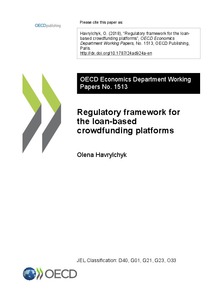Regulatory framework for the loan-based crowdfunding platforms

Organisation for Economic Co-operation and Development, Paris
OECD Publishing - Paris
2018
56 p.
sharing economy ; crowd work ; capital resources ; regulation ; financing
OECD Economics Department Working Papers
1513
Economics
https://doi.org/10.1787/24ad924a-en
English
Bibliogr.
"In a growing number of OECD countries policymakers are designing specific regulations for lending-based crowdfunding platforms. In March 2018, as a part of its Fintech action plan, the European Commission also presented its proposal for the EU-wide passporting regime. To evaluate these new regimes, this study collects information about the regulation of lending-based crowdfunding platforms in 17 OECD countries and proposes a theoretical framework to reflect about different regulatory regimes. In this context, we explore market failures in lending-based crowdfunding and identify regulatory challenges. Although lending-based crowdfunding platforms do not technically perform risk and maturity transformation, in some countries, flexible regulation allows them to experiment with different business models to provide services of credit risk management (via risk grades, provision funds, automated lending) and liquidity provision (via secondary markets). These platforms could perform the same functions as banks in the future, but there are theoretical reasons to believe that platform-based intermediation could be more stable than banking intermediation. The success of lending-based crowdfunding platforms hinges on their ability to solve moral hazard issues and overcome significant barriers to entry related to scale and scope economies, adverse selection, as well as funding cost advantage of incumbent large banks. There are also risks related to an excessive reliance on funding of leveraged and ‘too big to fail' institutional investors that are prone to runs and moral hazard problems."
Digital
The ETUI is co-funded by the European Union. Views and opinions expressed are however those of the author(s) only and do not necessarily reflect those of the European Union or the ETUI.